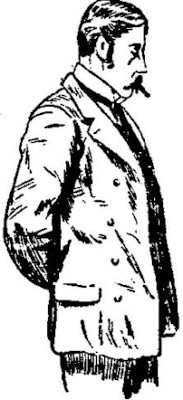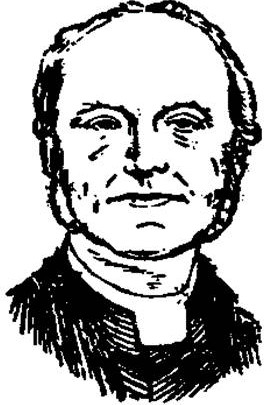This article has been transcribed from a copy of the Cardiff Times in the online collection of scanned Welsh newspapers 1804-1919 in the National Library of Wales, with grateful recognition of the free access accorded to all readers.
Explanatory Notes
The Irish Poet: 'The Young May Moon', Thomas Moore (1779-1852).
'past the witching hour of night, when the poet states that churchyards yawn and graves give up their dead': see Hamlet III.ii.377-8. ''Tis now the very witching time of night/When churchyards yawn …'
'tripped the light fantastic toe from eve to dewy morn': an appropriate Miltonic confection of the light-hearted and the demonic – 'trip it as you go/On the light fantastic toe' is from ‘L’Allegro’ 33-34), and 'from morn/To noon he fell, from noon to dewy eve' is from Paradise Lost book 1. 742-73, relating the fall of Mulciber).
'flat, stale, and unprofitable': see Hamlet I.ii.133. —— David Skilton

here are many men, and women, too, in this world who find the ordinary day is not long enough to enable them to obtain their full meed of pleasure, so they proceed to lengthen it in their own sweet way.
The best of all ways
To lengthen your days
Is to steal a few hours from night, my boys.
sang the Irish poet, and his disciples are a numerous and varied crowd. Late hours are yearned for even in youth, and the child who can coax its nurse or parents into allowing it to stay out of bed longer than usual thinks it has accomplished something to be proud of, and enjoys the extra hour’s respite more than any other portion of its waking day.

Wants to stay up an hour longer
And as the child grows so does the habit, especially with the male sex. Who does not know the feeling of pride which swells within the bosom of Master Tom when, for the first time in his life, he is allowed (or does it without being allowed) to stay up with his eiders till past the witching hour of night, when the poet states that churchyards yawn and graves give up their dead.
By the way I wonder if anyone ever saw a churchyard yawn? I never did, but perhaps my acquaintance with churchyards — and churches — may be more limited than other people's. But to my muttons [my subject].

Results of late hours
The youth thinks he is having a high old time of it when he retires to bed at one or two a.m., and this in spite of the fact that he is terribly sleepy, and has a very vague notion in his mind as to what has occurred during the last two or three hours.
Next morning he wakes up with a tremendous headache and a sense of burning pain in the region of his eyes.
What matters that? Is he not able to tell his friends that he feels 'a bit seedy. Didn't get to bed until the small hours, don't-yer know. Awfully jolly night. You know one doesn't really feel alive until after midnight.' And then he proceeds in the most patronising way to pity those 'vegetating' mortals who 'only exist, don't yer-know, dear boy.' It usually takes a man some considerable time to get used to the peculiar and unsatisfactory effects of late hours. In the early stages he finds he cannot rise with alacrity at his usual hour, and he displays a decided tendency to fall asleep during the early hours of the afternoon.
It is only when he returns to his late-hour haunts that he begins to feel himself again, and about the hour when sober Christian people are preparing to retire to rest he is just realising the fact that life is worth living. This kind of thing is like some poisons, accumulative, and a man in time gets so used to late hours that he cannot rest if he goes to bed at an ordinary time.

Likes Late Hours when Dancing
It is not the late hours pure and simple that do the mischief; it is the surroundings that [they] carry with them that damage the constitution and leave their marks upon the system of the man.
When a man sits up until the small hours of the morning it is only reasonable to suppose that there is something to attract him, and this is so. As a rule, the attraction takes the form of conviviality, interspersed with brilliant or pleasant conversation. In a word – Bohemianism. Of course there are cases where late hours are not beguiled with such pleasant surroundings. The student knows nothing of them, and late hours are to him a sine qua non, which brings but the perpetual grind of study and fatigue.

Thinks Late Hours Disgraceful
Ladies who lead fashionable lives are as used to late hours as the oldest habitu[é] of Bohemia. They think nothing of going to two or three dances in one evening evening, and they turn out next morning (after a judicious rest and a mysterious collection of revivers) as fresh as if they had retired to rest with the children, and had never tripped the light fantastic toe from eve to dewy morn in their lives.
A woman who would faint at the mere suggestion of a couple of hours' genuine work will dance from nine in the evening until four or five in the morning with but little rest, and turn up the next night prepared to repeat the programme without turning a hair.
But these late hours are not all pleasure, and they carry their penalties as well as their pleasures with them. The youth who at twenty commences to keep late hours with any degree of regularity will at thirty find he had not the vigour he ought to have. At forty he will find he cannot keep the hours he could, and life will, by the time he reaches fifty, have become flat, stale, and unprofitable to him.
Nothing tends to produce pessimism sooner than late hours, and the man who retires to rest at a reasonable hour is calculated to live longer and do more for himself and his fellows than the late birds who tell you they get more out of life than the ordinary mortals do.
Possibly they are right from their point of view, but when a man burns the candle of life at both ends he is certain to reach the centre and end of it far sooner than he who only burns it at one end and then puts it out as frequently as he can.
Last modified 27 April 2022